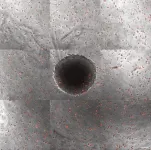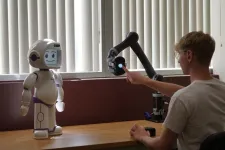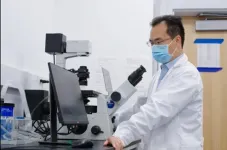(Press-News.org) Nov. 15, 2023
Media Contacts:
Emily Gowdey-Backus, director of media relations
Nancy Cicco, assistant media relations
The trillions of microorganisms living in gastrointestinal tracts may foretell diagnoses of debilitating diseases including Alzheimer’s and Parkinson’s
Microbiome may hold clues that could revolutionize diagnosis and treatment
Researchers at UMass Lowell’s Zuckerberg College of Health Sciences are exploring how the gut microbiome contributes to the risk of Parkinson’s and Alzheimer’s diseases. This research could lead to earlier detection and new treatments for people with those diseases, which impact millions of people in the United States and around the world.
In a new study, public health Associate Professor Natalia Palacios found that healthy, anti-inflammatory bacteria were less abundant among people who were diagnosed with Parkinson’s disease.
“These species of bacteria are known for their role in reducing inflammation in the gut,” said Palacios. “This depletion supports a potential link between gut inflammation and Parkinson’s disease. The fact that we see these changes before a diagnosis suggests that, in the future, the gut microbiome may serve as a biomarker for identifying the earliest phases of the disease. This has the potential to revolutionize the diagnosis and treatment, as early detection is often key to developing new therapies.”
The results of the study, which was funded by a $2.1 million grant by the National Institutes of Health, highlight the critical role of the gut-brain axis, a two-way communication system that connects the gastrointestinal tract and the central nervous system.
Palacios and fellow researchers at Harvard University conducted a comprehensive analysis of the genetic material found in the gut of 420 participants from two large epidemiological studies – the Nurses’ Health Study and the Health Professionals Follow-Up Study. From this group, they found a consistently lower abundance of certain types of anti-inflammatory, anaerobic bacteria in people with Parkinson’s disease. This change was also noticeable among study participants who experienced early signs of Parkinson’s disease, which can predate the onset of the classic motor symptoms by many years.
However, Palacios isn’t done interpreting how the gut reflects of the body overall.
Funded by a new $2 million grant from the NIH, Palacios and biomedical and nutritional sciences Professor Katherine Tucker are conducting the largest comprehensive study of the microbiome in Latinos to better understand the link between the gut microbiome and Alzheimer’s disease. The researchers will study participants in the ongoing Boston Puerto Rican Health Study (BPRHS), a long-term research project launched in 2004 to examine the roles of stress, social support, diet, health behavior and genetic predisposition in relation to health disparities in Puerto Rican adults.
Tucker leads the BPHRS as the director of the UMass Lowell Center for Population Health.
“Puerto Ricans, who suffer from health and social disparities, have a 50% greater risk of Alzheimer’s disease compared with the general population,” said Tucker. “We have been conducting cognitive assessments and measuring the diets and health outcomes in this cohort for almost 20 years, so we have a lot of data for this new study.”
“The results of our study could lead to novel biomarkers for Alzheimer’s disease, as well as a better understanding of what causes the disease,” Palacios said.
With updated cognitive assessments and the analysis of MRI brain scans and blood and stool samples, the research team will identify the gut composition in each participant, the function of each species of bacteria, and any harmful molecules that could cause disruption in the brain.
What the researchers learn from the study could impact millions of people: More than 6 million Americans are living with the brain disorder, according to the Alzheimer’s Association. By 2050, that number is projected to grow to 12.7 million.
END
Microorganisms living in gastrointestinal tracts may foretell diagnoses of debilitating diseases including Alzheimer’s and Parkinson’s
Microbiome may hold clues that could revolutionize diagnosis and treatment
2023-11-15
ELSE PRESS RELEASES FROM THIS DATE:
Longitudinal characterization of behavioral, morphological and transcriptomic changes in a tauopathy mouse model
2023-11-15
“Here we used the PS19 (P301S) mouse model of tauopathies to characterize longitudinal changes in behavioral, morphological, and transcriptomic levels.”
BUFFALO, NY- November 15, 2023 – A new research paper was published on the cover of Aging (listed by MEDLINE/PubMed as "Aging (Albany NY)" and "Aging-US" by Web of Science) Volume 15, Issue 21, entitled, “Longitudinal characterization of behavioral, morphological and transcriptomic changes in a tauopathy mouse model.”
Neurodegenerative ...
Two Sandia National Labs researchers elected associate fellows for aerospace contributions
2023-11-15
ALBUQUERQUE, N.M. — Two Sandia National Laboratories employees will soon join the American Institute of Aeronautics and Astronautics class of 2024 as associate fellows.
“This distinguished group of professionals has made significant and lasting contributions to the aerospace profession,” said AIAA President and Sandia Deputy Laboratories Director Laura McGill. “They exemplify expertise and dedication to excellence in advancing their specific technical disciplines. They are truly shaping the future of aerospace, and we are proud of their achievements.”
Michael Ross
Michael Ross was recognized for his work in ...
UTHealth Houston researcher receives NIH subcontract to study effects of integrated palliative care on Parkinson’s, related dementia
2023-11-15
A five-year, $3.9 million grant to study the effects of integrated palliative care on health service outcomes and disparities in Parkinson’s disease and Parkinson’s disease dementia has been awarded to UTHealth Houston and other institutions by the National Institute of Neurological Disorders and Stroke, part of the National Institutes of Health.
As part of the grant, Adriana Pérez, PhD, professor in the Department of Biostatistics and Data Science with UTHealth Houston School of Public Health ...
Shape-shifting immune cells offer new insights into cancer immunotherapy
2023-11-15
Macrophages, a type of white blood cell that can destroy invading pathogens, have an innate ability to infiltrate tumor cells, making them a potentially important tool in treatments that use transplanted cells to fight disease, known as cell therapy. In the lab, macrophages show a lot of promise in treating cancer but so far, clinical trials have been a disappointment and biologists are trying to figure out why.
But what if it’s not a biological problem?
In a recent paper, researchers from the Harvard John A. Paulson School of Engineering and Applied ...
All aquatic species in river mouths are contaminated by microplastics
2023-11-15
All aquatic species in the river mouths flowing into the Mediterranean Sea and Atlantic Ocean are contaminated with microplastics, with molluscs being the most affected due to their ability to filter water. Rivers are one of the main sources of pollution by microplastics (5 to 0.0001 mm in size) and nanoplastics (smaller than 0.0001mm) in the oceans. Estuaries, as transition zones between rivers and the sea, are major hotspots for the accumulation of these particles, which are retained in sediments. They pose a threat to aquatic ecosystems given their ability to capture harmful chemicals from the surrounding environment, ...
Smaller hippocampus linked to cognitive decline
2023-11-15
MINNEAPOLIS – With the rise of new drugs that can target the amyloid-beta plaques in the brain that are an early sign of Alzheimer’s disease, new ways are needed to determine whether memory loss and thinking problems are due to Alzheimer’s disease or another neurodegenerative disorder. A new study published in the November 15, 2023, online issue of Neurology®, the medical journal of the American Academy of Neurology, shows that shrinkage in the hippocampus area of the brain is associated with cognitive decline, even in people who don’t have amyloid plaques in the brain. The hippocampus plays a role in memory.
“These results suggest ...
ECOG-ACRIN and PrECOG announce multiple presentations at the American Society of Hematology (ASH) 2023 annual meeting
2023-11-15
Researchers with the ECOG-ACRIN Cancer Research Group (ECOG-ACRIN) and PrECOG, LLC, will present six oral and three poster presentations at the 65th American Society of Hematology (ASH) Meeting & Exposition, occurring in San Diego, California and virtually December 9-12, 2023. The presentations focus on treatments for acute leukemias and lymphomas.
Among the data are the promising results of the phase 2 PrE0405 trial, which evaluated bendamustine, rituximab, and venetoclax for the initial treatment of mantle cell lymphoma in older patients. Other ...
Use it or lose it: New robotic system assesses mobility after stroke
2023-11-15
Embargoed: Not for Release Until 2:00 pm U.S. Eastern Time Wednesday, 15 November 2023
Stroke is a leading cause of long-term disability worldwide. Each year more than 15 million people worldwide have strokes, and three-quarters of stroke survivors will experience impairment, weakness and paralysis in their arms and hands.
Many stroke survivors rely on their stronger arm to complete daily tasks, from carrying groceries to combing their hair, even when the weaker arm has the potential to improve. Breaking this habit, known as “arm nonuse” or “learned nonuse,” can improve strength and prevent injury.
But, determining how much ...
Birds set foot near South Pole in Early Cretaceous, Australian tracks show
2023-11-15
The discovery of 27 avian footprints on the southern Australia coast — dating back to the Early Cretaceous when Australia was still connected to Antarctica — opens another window onto early avian evolution and possible migratory behavior.
PLOS ONE published the discovery of some of the oldest, positively identified bird tracks in the Southern Hemisphere, dated to between 120 million and 128 million years ago.
“Most of the bird tracks and body fossils dating as far back as the Early Cretaceous are from the Northern Hemisphere, particularly from Asia,” says Anthony Martin, first ...
University of Kentucky bioengineer designs tools to improve treatment for head and neck cancer
2023-11-15
LEXINGTON, Ky. (Nov. 15, 2023) — One University of Kentucky researcher is working to develop new techniques for radiation treatment to improve survival rates of patients with a specific type of cancer.
Caigang Zhu, Ph.D., is an assistant professor in the Department of Biomedical Engineering in the UK Stanley and Karen Pigman College of Engineering. He is also a member of the Molecular and Cellular Oncology Research Program at the UK Markey Cancer Center.
The National Institute of Dental and Craniofacial Research of ...
LAST 30 PRESS RELEASES:
New knowledge on heritability paves the way for better treatment of people with chronic inflammatory bowel disease
Under the Lens: Microbiologists Nicola Holden and Gil Domingue weigh in on the raw milk debate
Science reveals why you can’t resist a snack – even when you’re full
Kidney cancer study finds belzutifan plus pembrolizumab post-surgery helps patients at high risk for relapse stay cancer-free longer
Alkali cation effects in electrochemical carbon dioxide reduction
Test platforms for charging wireless cars now fit on a bench
$3 million NIH grant funds national study of Medicare Advantage’s benefit expansion into social supports
Amplified Sciences achieves CAP accreditation for cutting-edge diagnostic lab
Fred Hutch announces 12 recipients of the annual Harold M. Weintraub Graduate Student Award
Native forest litter helps rebuild soil life in post-mining landscapes
Mountain soils in arid regions may emit more greenhouse gas as climate shifts, new study finds
Pairing biochar with other soil amendments could unlock stronger gains in soil health
Why do we get a skip in our step when we’re happy? Thank dopamine
UC Irvine scientists uncover cellular mechanism behind muscle repair
Platform to map living brain noninvasively takes next big step
Stress-testing the Cascadia Subduction Zone reveals variability that could impact how earthquakes spread
We may be underestimating the true carbon cost of northern wildfires
Blood test predicts which bladder cancer patients may safely skip surgery
Kennesaw State's Vijay Anand honored as National Academy of Inventors Senior Member
Recovery from whaling reveals the role of age in Humpback reproduction
Can the canny tick help prevent disease like MS and cancer?
Newcomer children show lower rates of emergency department use for non‑urgent conditions, study finds
Cognitive and neuropsychiatric function in former American football players
From trash to climate tech: rubber gloves find new life as carbon capturers materials
A step towards needed treatments for hantaviruses in new molecular map
Boys are more motivated, while girls are more compassionate?
Study identifies opposing roles for IL6 and IL6R in long-term mortality
AI accurately spots medical disorder from privacy-conscious hand images
Transient Pauli blocking for broadband ultrafast optical switching
Political polarization can spur CO2 emissions, stymie climate action
[Press-News.org] Microorganisms living in gastrointestinal tracts may foretell diagnoses of debilitating diseases including Alzheimer’s and Parkinson’sMicrobiome may hold clues that could revolutionize diagnosis and treatment









